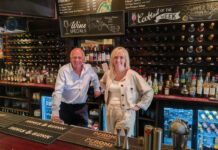Craft spirits are no longer the preserve of high-end city centre bars
PUB operators looking to make the most of the recent boom in craft spirits needn’t worry about cramming their shelves to bursting with every new brand from the UK and overseas.

The message from drinks firms is that the best way for traditional pubs and mainstream bars to command their own slice of the craft cake is to stock a small but interesting range of products and ensure staff are well-informed about the background to each spirit.
“Drinkers are far more interested in the provenance of their spirits these days, especially when they’re buying premium products,” said Lara Williams, brand ambassador for craft distiller Eden Mill.
“The story behind a bottle can often be the deciding factor and if those who are selling what’s inside don’t know this story, they could be damaging the trajectory of the brand. Staff training and tastings are an invaluable part of working with alcohol and businesses will suffer if they don’t put the time and effort into communicating this information to their staff.”
Don’t try to be all things to all people. Concentrate on small batches of products.
But that doesn’t mean pubs and bars should load up on every craft spirit they can find.
Ian Cumming, commercial director at wholesaler Inverarity Morton, warned licensees against “overkill” on craft spirits, but said that mainstream venues should “absolutely” be stocking a small selection.
“Don’t try to be all things to all people,” said Cumming.
“Yes, have a range, but concentrate on small batches of products that fit your outlet and your customers and get your staff behind them.
“Know the products, know the stories behind them and speak about them to customers.”
Enthusiasm is even more important than knowledge, when it comes to making the most of any craft spirits range, according to Michael Lovedale of Glasgow-based Hotsauce Drinks.
“Taste these products with your staff, if they love them they’ll sell them without trying,” he said.
And Lovedale reiterated that a small, craft selection can be more effective for licensees than a sprawling range.
“A small gantry stocked with products that staff are enthusiastic about will always work better than a huge gantry which, without a huge amount of knowledge, can seem intimidating.
“If you get staff who are enthusiastic about [the spirits], get some training in place and stock brands that excite your staff, then this will look after itself.
“Enthusiasm is worth infinitely more than knowledge alone.”
Dan Bolton, managing director of Hi-Spirits, agreed.
“Every pub has to make its own call on how broad a spirits range its customers will buy into,” said Bolton.
“In the mainstream on-trade, speed of service is important so a small range of craft brands that lend themselves to a range of serves is the best approach.”
And Andrew Richardson of VC2 Brands, the firm behind Boë Superior Gin, advised licensees: “Don’t stock too many, as many will just gather dust.”
Every pub has to make a call on how broad a spirits range its customers will buy into.
While gin is currently the category making the biggest waves in craft spirits, sectors such as rum and tequila were also said to be proving popular with pub and bar customers.
Lovedale, of Hotsauce, advised licensees not to limit themselves to one particular style of craft spirit.
“Stock local if it’s appropriate – Scottish gins sell fantastically but other products can’t be produced locally; there’s no such thing as local tequila,” he said.
“While local is preferable there are great spirits being produced across the world and it would be a shame to restrict ourselves to one kind of drink.”
And while choosing the spirits themselves is hugely important, the rise of craft spirits has come hand-in-hand with a boom in another, related type of product: craft mixers.
Abbigale Wallis of Global Brands, the firm behind the Franklin & Sons range of mixers, said different craft gins, for example, require mixers with different flavour profiles.
“Gin is unique, each with its own flavour profile created with a wide variation of botanicals; the choice of mixer for your perfect gin pairing is just as important,” said Wallis.
And Fergus Franks, on-trade manager at Fever-Tree, said that mixers “are no longer seen as an afterthought but as a principal ingredient in their own right”.
The firms behind the UK’s mixer brands also stressed that craft products are no longer the province of the country’s top-end cocktail bars.
Andrew Jackson of mixer brand Fentimans, said that, with consumers in the trade willing to spend more on premium products, “it’s never been more important that pubs can compete with offerings traditionally reserved for premium cocktail bars by offering an informed, exciting and flavoursome range of craft spirits and mixers”.























